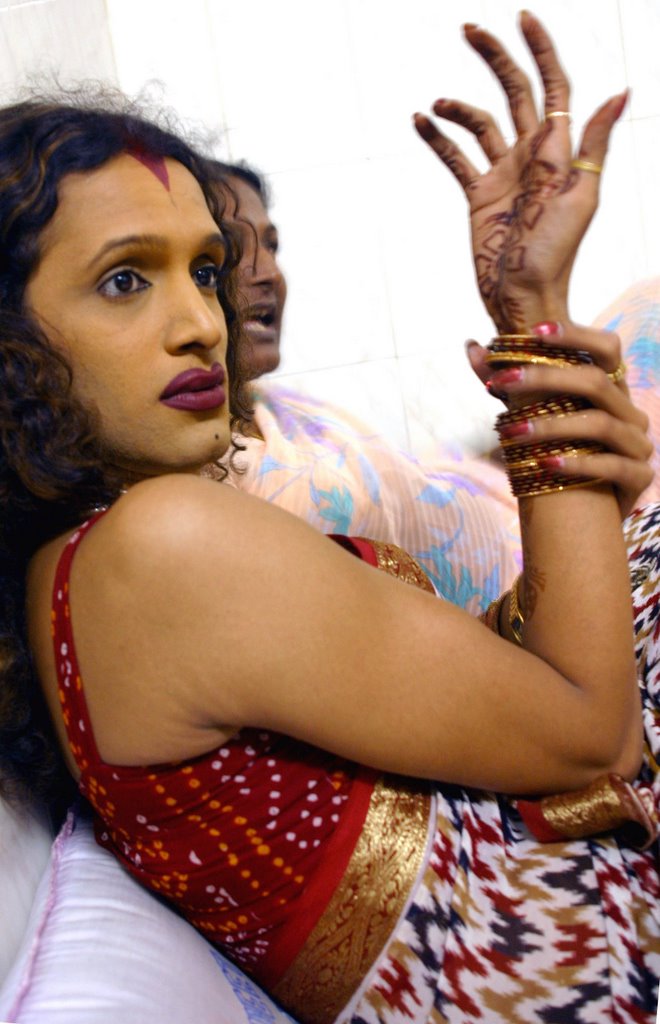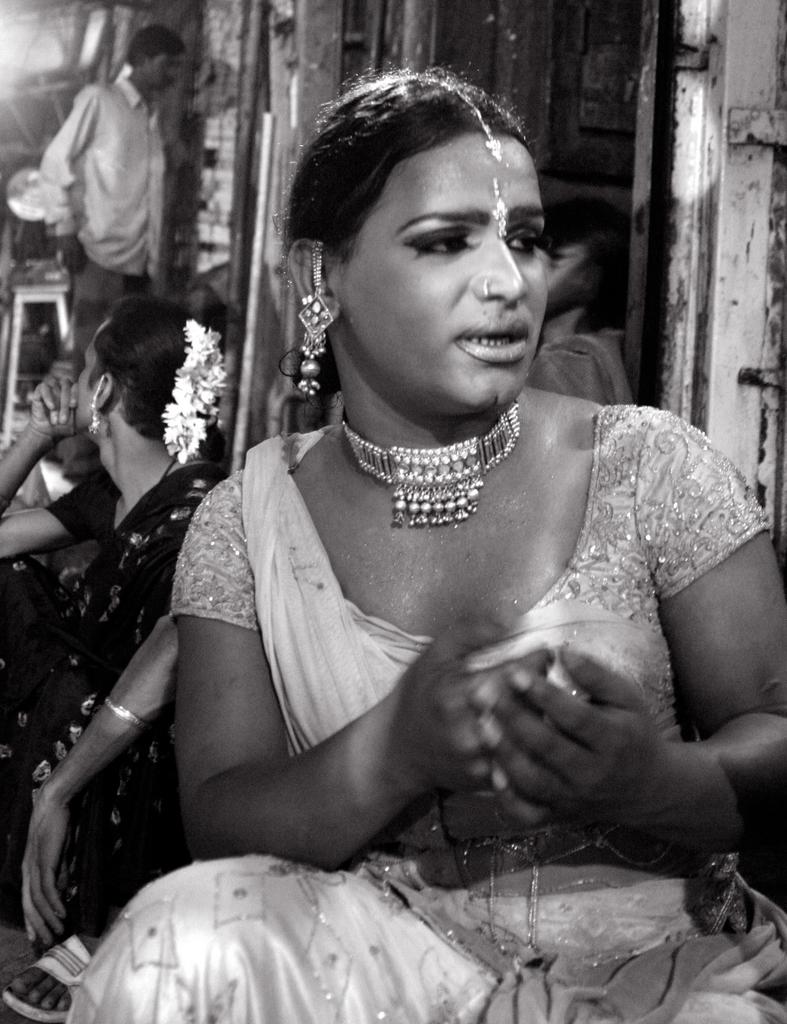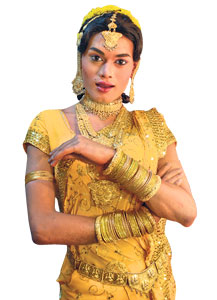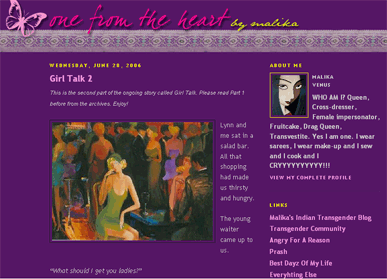
Bharatanatyam dancer, owner of nine dance schools. Outcaste turned hero, gorgeous, flamboyant, Laxminarayan Tripathi embodies all the schisms in the world of the dance bar: the ignominy and the freedom, the pride and the pathos. As the voice of an entire community of hijras, she strikes an ironically hopeful note in the last profile in this series.
"Ooh La la! So sexy” gasps Laxminarayan Tripathi in her loud nasal twang, as a young man in tight jeans and silver vest catches her eye. “Tissue paper, sweetheart,” she confides. “One time use only.” Another hijra may have balked at drawing attention to herself in a crowded, upscale Bandra coffee house, but Laxmi, 5’11 in a green salwar kameez and delicate white, beaded jootis, keeps her voice high and leaves the couch often to lope around the room with lanky strides — to meet friends, talk to waiters, visit the bathroom. The former dance bar girl and now social activist is a whirlwind. Dramatic, voluble, sensuous, impossible to contain and welcoming of attention.
Laxmi was born in Thane in 1979, the eldest child of an orthodox Brahmin couple from Uttar Pradesh. Her early years were marred by sickness — double pneumonia, typhoid and asthma. Her parents coddled her, permitting allowances other children couldn’t have dreamt of. “I was their golden boy,” she sighs in flawless English, which she intersperses throughout with chaste Hindi. In the second standard, Laxmi was enthralled by Bharatanatyam, its costumes, make-up and jewellery. Despite their initial discomfiture, her parents allowed her to pursue her passion.
This was the first time the Tripathis confronted whispers about their son. Despite their reservations, Laxmi says they supported her, smiting criticism with “Mind your own business. He’s our child.” She says, “God couldn’t be everywhere, so he created my mother. She’s a gem. And my father is such a strong person, touch wood. Every hijra should have parents like mine.” The little boy in the purple and gold Krishna outfit, wide black eyes accentuated with kajal, soft, perfumed cheeks rubbed red with rouge, continued studying dance in Thane’s Singhania High and Bim’s Paradise schools.
It was at six that Laxmi was first sexually abused by an acquaintance. She will only divulge that the abuse lasted until she turned 12. “Many hijras were abused as children,” she points out. In the ninth grade, Laxmi met Shabina Frances, another hijra. They became friends and Shabina promised her she’d be her guru if she joined them. Shabina, along with some other educated, socially conscious hijras, was the founder of Dai Welfare Society, a Mumbai-based ngo, which works for the community, especially on hiv/aids awareness and access to the medical fraternity.
Laxmi was aware of the hijras much before she met Shabina, aware that in mainstream society the term “hijra” has a derogatory connotation. She says, “People used to call me a hijra for years, and because they did I didn’t want to know about hijras. Eventually, the things you evade, confront you. And now I’m here.” The community introduced Laxmi to the freedoms of living with people similar to her. She familiarised herself with the hierarchy of power and the rules, which she describes in broad strokes, refusing to divulge secrets she believes are her responsibility to protect. “How did I know that I was a hijra?” she mulls. “I don’t know. I asked myself that. I tried to run away, but I kept returning. Even now, it’s a question that’s on my mind 24 hours. But do I want to go back (to the mainstream)? No! My soul won’t allow it.”
By the time she joined Mithibai College, Laxmi shrugged off the last chains of constraint. She was the only drag queen on campus, and describes herself as “slutty, bitchy, and sexy”. Her passion for dance continued, she opened what is now a chain of nine Bharatanatyam and contemporary dance schools, called Lucky Chance Dance Academy in Thane. While studying for a commerce diploma she choreographed dance events and became a model coordinator.
One of Laxmi’s explorations led her to work for five years at the Duru dance bar in Ulhasnagar. She laughs, “If I’d been a woman, I’d have had a kotha of my own! I wanted to be a courtesan,” she adds ironically, “it’s such a respectable job.” Atharva Nair, Laxmi’s friend and assistant at Dai, laughs loudly. “Tell her the truth,” he gurgles. “You wanted to lure men!” Laxmi is unabashed. “He’s a bad boy, but it’s true,” she drawls. “I love to play with men. I joined to see why men frequent dance bars. I would pretend to love them, but I’d think, ‘Bastards. You leave your wife at home and come here to satisfy your whims!’ Luckily for me, I made good money.”
Since the ban on dance bars on August 14, Laxmi has seen many of the bar dancers she knew become prostitutes. She says, “They’re being made to dance naked in the midst of a group of men. They’re dancing at homes, cabarets, indulging in unsafe sexual behaviour. They’re more vulnerable. One case of Tarannum Khan (the dance bar girl in police custody for her alleged links with bookies) doesn’t prove that all bar girls have links with the underworld, or are rich. These false linkages have been created for political benefit.”
Despite the odds, Laxmi is empowered — partly because of her work at Dai, of which she is now the president. Co-funded by the Mumbai District aids Control Society and the National aids Control Organisation, the ngo now has 70 members, all hijras. It organises advocacy meetings with local leaders and the police, is campaigning for the inclusion of the word transgender in the Constitution, and is fighting for equal rights to education and employment.
Laxmi believes getting the mainstream and hijra communities to interact will end the stigmas and misconceptions. Recognition and respect will begin. A recent survey by Dai reports that 49 percent of the city’s 2.5 lakh hijras are infected with hiv/aids. “Hijras are on the verge of extinction, dying like flies,” Laxmi says. She is working on a New Year’s eve programme in Thane which will further interaction with the mainstream.
As the president of Dai, Laxmi earns a salary of Rs 10,000 a month, which she supplements with badhai. She receives 25 percent of the earnings from her dance schools, now run by an array of assistants. On occasion, she makes special appearances in films — she has choreographed and acted in Inder Kumar’s Aashiq and a music video. She appears in an episode of Lonely Planet’s Six Degrees and the award-winning documentary Between the Lines on the Third Gender.
Her education and fluency in English, combined with the continued support of her younger brother Shashinarayan, sister Rukmini and her parents has allowed Laxmi to be part of both the hijra and mainstream communities. The experiences are like night and day. Yet, she says, it is only by inhabiting both worlds that she feels complete. Unlike many hijras, Laxmi hasn’t changed her biological name or left home. She has innumerable chelas or followers, from whom she refuses a portion of their earnings. But with her guru Pinky, a “sweetheart”, she plays the role of chela with gusto. She is the best spokesperson her community could get. “I am respected because of my work and because of how I treat my people,” she says. “Some are in prostitution, fine, I’m not. But they’re still my hijras.” She holds out her hand, “This finger’s mine, and this. Which one to cut? The pain will be mine.”
Laxmi’s insights have led her to be sought out, and she is aware of her own value. “I do charge people for interviewing me on-screen,” she admits, red talons gleaming, long fingers playing with her gold watch. “I don’t charge them like Madhuri Dixit or Aishwarya Rai would, but I do require an honorarium. If the BBC wants to interview me I will talk in pounds. If Discovery wants me I’ll talk in dollars, to a German production I will talk in Euros. This is the time I must earn and save money.”
During this interview, a woman behind us at the coffee shop had been desperate to listen in on the conversation. Unable to bear the suspense, she perches at our table, and says, “I’ll just leave after this call.” Fiddling with her cell phone she tries to unobtrusively absorb Laxmi’s unusual look. When I ask her to leave, Laxmi laughs cordially. “Let her listen,” she says in a sugary voice. “You enjoy yourself baby. It’s good, people should listen.” She launches into a graphic conversation about sex. Mouth open, the girl shuts her phone, exits. Laxmi cackles, “The moment I told her ‘sit and listen’ she ran off! These are the things I do!” These and more.
Dancer turned social activist. Outcast turned hero. Laxminarayan Tripathi may have a sexually ambiguous name, but there is nothing ambiguous about either her achievements or the distance she continues to travel."
Part II:
“We can be very nasty. I was proud of that. I enjoyed it”
Laxminarayan Tripathi, also president of Dai Welfare Society, an NGO of hijras working for hijras, speaks to Sonia Faleiro about the innards of the community
How would you define a hijda?
Someone who has a hijda’s soul. Unless you have that you can’t be a hijda. Someone who is feminine but not a woman, masculine but not a man. beyond the boxes of man and woman is the Third Gender, and that is the hijda. Someone who follows the rules and regulations of the community, has a guru, and lives in saris. We have our own community, culture, and background. You can be a castrated man and still be a man. You can be a non-castrated hijda and still be a hijda.
So a hijda needn’t be a eunuch?
Not at all. You don’t have to be castrated to be in the community. I’m not. You don’t have to take hormone pills. That depends on your whims—if you want to look more beautiful, womanlier. For those that aren’t castrated, the nearest English word is transgender. The Hindi word for both castrated and non-castrated members of this community is hijda.
The castration is done by a dai. Why?
It has religious and historical connotations. The ancient technique, which we continue to follow. Castration is illegal in India, if it were legalised it would be so good for hijdas. But I don’t want to go into details. These are community secrets.
Is there a class system?
No. There are three sub-groups. Dancing and singing at the birth of a child or at weddings is called Badhai. Begging at streetlights or shop to shop is called Mangti. And the third is prostitution, Dhandawali. Your own abilities decide what you do.
Why are hijdas relegated to only three professions?
There are no schools in which hijdas are allowed. Where there are men, women and hijdas. Without education, how can there be jobs? The British exploited and marginalised the community and we haven’t recovered since then. They saw the power of the Third Gender, their influence among the Nizams, the Rajputs, as holders of the palace keys, as protectors of the queen’s harems, as members of the advisory committee, even as warriors like Shrikhandi in the Mahabharata. The British chopped our power and hijdas needed the permission of the Collector’s office to even leave home. After India gained Independence, hijdas lost their freedom even more. We became more vulnerable. So what remains? Clapping hands, begging, dancing. Otherwise you sell your body for survival.
What does the clapping signify?
It signifies that we are hijdas. It excludes us from everyone else.
There’s also the sari lifting. Have you done that?
I did it for the first time on Navratri, in Thane. I was dancing the garba and this man kept trying to touch me everywhere. He pulled my chain and caught me by my slip. I called my chelas and we danced naked. We stripped off everything and showed him real colour of our community—how nasty we can be. I was proud of what I did. I enjoyed it.
Can you explain the Guru-Chela relationship?
We have an ancient guru-Chela parampara, so you need a guru to be in the community. You can choose you own guru, but sometimes, perhaps in love, you make the wrong decision. A guru is your representative in the community. If she’s good, she’ll teach you the rules and regulations. For example, one must always speak politely to the elderly, never back answer the guru, how to behave in a large group, the songs and dances. A guru will warn you about the good and bad and teach you how to live within the community as well as the external world. A Guru will choose a favourite chela to give her property to. In turn the chela must take care of the guru in her old age and perform her last rites. It’s a parent child relationship.
And who are the Nayaks?
The leaders above the gurus are known the Nayaks. There are seven Nayaks, all in Mumbai. They are the head of the community, and are highly respected. They are our Supreme Court.
Is the guru-chela relationship built on fear?
Always. They can be mad on their power. Sometimes, if the chelas are not strong, their gurus physically abuse them.
What portion of a chela’s earnings does the Guru take?
Earlier it used to 100 per cent, and the Guru would dole out pocket money if she wanted. That’s how the exploitation by the Gurus started. Now it’s 25 or 50 per cent. I’m the rare guru who takes nothing at all.
Are you allowed to speak out about the community? I’m one of the few who is. I’m from a different background than most hijdas, and that made me open to the world. My education, parents, way of living, the fact that I never faced discrimination makes a difference. Today I walk into _Mocha (a coffee house) and no one looks at me. But for another hij it would be harder. I present myself differently than most hij’s because how one looks make a vital difference.
How do you react when people stare at you?
Agar zamana mujhe dekhte hai to mein dekhne ki cheez hoon. To zamana mujhe dekhegi hi. I’m a consumer. I pay for things. I know what my rights are in a democracy. Nobody can stop me. But people do pay comments on the street, particularly where I live, in Thane. I’ve been called proud, a bitch, slut, whore, that I sleep around, and supply girls through my dance classes. But that’s what any proud girl has to hear from men!
Why is the community so quiet about what it does?
It’s a question I keep asking. Why are you so quiet, why don’t you fight for your rights? But if you’ve been traumatized by the non-acceptance of your own parents, it’s very hard to face the world. After that hurt you cannot survive facing the rest of the world.
People fear hijdas. Do you know why?
Misconceptions, like when we die our bodies are hit with chappals, that we steal children. That’s just rubbish, rubbish! If you abandon your child because he has the soul of a hijda, why shouldn’t we keep him? We can’t afford to abandon him as well. Or that once you join the hijdas you can’t go back. Some people do cut their hair, and return.
But it’s funny, because on one hand, we’re respected, because Krishna said when you bless you will be blessed and when you curse, you will be curse. People like to be blessed by us. On the other hand people discriminate against us. Some give us money because of the blessings they hope to receive, others because they want to get rid of us; they don’t want us to clap our hands and lift our saris. This reaction of fear also demonstrates our power. Then there are those who come to hijdas for their sexual gratification, for things women do not provide, like oral sex and anal sex. The times of Khajuraho are gone; we are a conservative country now. But hijdas are still very open.
How does the community view sex?
As lust. Nothing more. But after a certain age, when you reach a certain level in the community, sex is not important, the community is. It’s a misconception that hijdas are promiscuous. That’s like saying all men are promiscuous. Then again, I don’t think monogamy exists. The only monogamous man was Ram, and I doubt that even he was monogamous!
What do you wish was different for hijdas?
Simple—give love, take love. Tum agar mujhe pyar se dekhegi mein bhi tumhe behen karke bolonji. If you talk rubbish, naturally I will curse you, clap my hands and lift my sari. What other alternative do I have? Mein khud hi dukhon se bhari huyin hoon, thhukrai hoon, tum mujhe pyar ki nazron se dekhegi, mere kandhon pe ek soft hand dalogi, I’ll give my heart to you, my soul to you. Accept us. We are one of you. We haven’t fallen from the Seventh Sky. But it will take decades for this situation to change. Mainstream society must be part of this change, it must create acceptance.
Why do hijdas break contact with their families after joining the community?
Because there’s no acceptance. The family is taunted: Hijde ka ma, hijde ka baap, hijde ka bhai. It’s not a rule. I’m still very close to my biological parents and my siblings. We may not have blood relations within the community, but we have strings of relations, entwined to build a rope.
What do you love, and what would you change about the community?
I want the exploitation by the Gurus to end. Everyone should be allowed his or her individuality. This is the tragedy of our community, we’re stigmatised by the mainstream community and then exploited by our own people. It leads to enormous trauma. I love the beauty and colour of the hijdas, the fact that it’s a divine community.
by Sonia Faleiro from Tehelka. November 14 2005. Photos by Sanjiv Valsan







